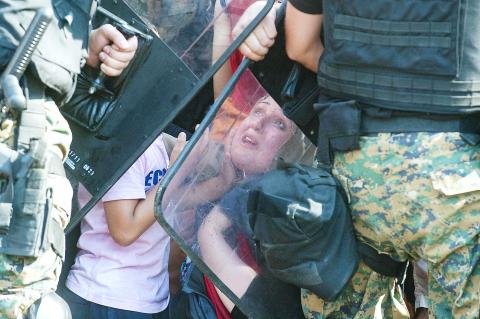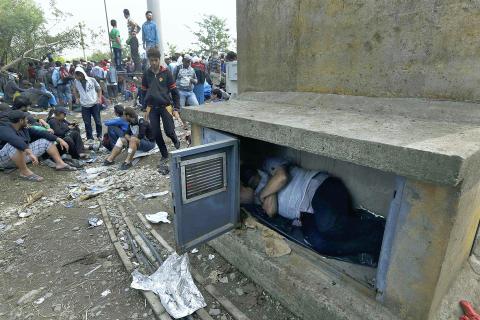Tensions at the Greek-Macedonian border erupted into clashes on Friday, when Macedonian police used stun grenades to try to disperse a large group of migrants trying to cross the border into Macedonia.
The UN refugee agency expressed deep concern about the clashes, which took place a day after the Macedonian government declared a temporary state of emergency and tried to clamp down on a growing flood of migrants trying to reach wealthier western European countries through the Balkans.
By evening a wary calm had been restored at the border crossing outside the Macedonian town of Gevgelija, where the clashes took place early in the day. For many, despair later turned into a kind of relief when the authorities relented somewhat and allowed several groups of migrants to cross the border in an orderly way.

Photo: AFP
However, about 3,000 tired and frightened men, women and children, most of them fleeing war zones in Syria, Iraq or Afghanistan, were still waiting on Friday evening in a neutral zone between the Greek and Macedonian sides, hemmed in by barbed wire and surrounded by soldiers and armed police officers. Many found makeshift shelter in one of the dozens of tents that were set up on the site.
“It is a fact that we are facing an increased pressure from the influx of migrants attempting to cross the border,” Macedonian Ministry of Internal Affairs spokesman Ivo Kotevski said. “But so far we have the situation under control, and there have not been any major incidents or injuries.”
Before the state of emergency was declared, large numbers of migrants who had made their way to Greece, often in perilous sea crossings by small boat, would head north to Macedonia, often crossing the relatively porous border by train or by walking along the tracks. While Macedonia is not a member of the EU, travel costs there are relatively low, and other countries in the region have tightened their border controls recently, making it a preferred route north for migrants.

Photo: Reuters
However, the Macedonian police moved to stiffen the border on Friday, sharply limiting the number who could cross and fencing off the railroad right of way through Gevgelija with barbed wire and armored vehicles. The government also used its temporary authority under the state of emergency to deploy army troops along the border.
Critics of the government said the moves would only drive the migrants to try to sneak across in more dangerous ways, or fall victim to traffickers.
“There was no need for declaring a state of crisis,” said Jasmin Redzepi of Legis, a nonprofit organization that provides support to migrants. “It appears to come as a result of the increased pressure from the local citizens.”
Residents of Gevgelija have protested the physical and environmental toll that the crowds of migrants are taking on the area, filling all the town’s public spaces and straining its resources.
Redzepi said slow processing of requests for asylum was “one of the main reasons for the forming of big crowds” at the border, where he said the migrants face “very bad conditions, with no access to toilets and with only food and water that activists and local citizens manage to supply.”
Macedonian Prime Minister Nikola Gruevski said the state of emergency was a temporary measure intended to control the flow of migrants “so that they will have more humane transport through Macedonia. The country does not have the capacity to help so many people, so we had to intervene.”
About 42,000 migrants have traveled through the country in the past two months, according to the Ministry of Internal Affairs. That figure is equivalent to 5 percent of the country’s total population of about 2.1 million.
Advocacy groups like Amnesty International reacted to the clashes on Friday by criticizing the state of emergency.
“Every country has the power to patrol its own borders, but this kind of paramilitary response is an unacceptable pushback, in violation of international law,” Amnesty International Europe deputy director Gauri van Gulik said.
The group called on the national authorities to switch their focus to humanitarian conditions.
“Instead of sealing off the border, the Macedonian and Greek authorities must focus on providing shelter, food, clothing and health care, with help from the international community if needed,” the group said in a statement.
In a statement from its Geneva headquarters, the UN High Commissioner for Refugees said it was “particularly worried about the thousands of vulnerable refugees and migrants, especially women and children, now massed on the Greek side of the border amid deteriorating conditions.”
UN High Commissioner for Refugees Antonio Guterres said in the statement that he had spoken with Macedonian Minister of Foreign Affairs Nikola Poposki about the problem, and “received assurances that the border will not be closed in the future.”

Kehinde Sanni spends his days smoothing out dents and repainting scratched bumpers in a modest autobody shop in Lagos. He has never left Nigeria, yet he speaks glowingly of Burkina Faso military leader Ibrahim Traore. “Nigeria needs someone like Ibrahim Traore of Burkina Faso. He is doing well for his country,” Sanni said. His admiration is shaped by a steady stream of viral videos, memes and social media posts — many misleading or outright false — portraying Traore as a fearless reformer who defied Western powers and reclaimed his country’s dignity. The Burkinabe strongman swept into power following a coup in September 2022

‘FRAGMENTING’: British politics have for a long time been dominated by the Labor Party and the Tories, but polls suggest that Reform now poses a significant challenge Hard-right upstarts Reform UK snatched a parliamentary seat from British Prime Minister Keir Starmer’s Labor Party yesterday in local elections that dealt a blow to the UK’s two establishment parties. Reform, led by anti-immigrant firebrand Nigel Farage, won the by-election in Runcorn and Helsby in northwest England by just six votes, as it picked up gains in other localities, including one mayoralty. The group’s strong showing continues momentum it built up at last year’s general election and appears to confirm a trend that the UK is entering an era of multi-party politics. “For the movement, for the party it’s a very, very big

ENTERTAINMENT: Rio officials have a history of organizing massive concerts on Copacabana Beach, with Madonna’s show drawing about 1.6 million fans last year Lady Gaga on Saturday night gave a free concert in front of 2 million fans who poured onto Copacabana Beach in Rio de Janeiro for the biggest show of her career. “Tonight, we’re making history... Thank you for making history with me,” Lady Gaga told a screaming crowd. The Mother Monster, as she is known, started the show at about 10:10pm local time with her 2011 song Bloody Mary. Cries of joy rose from the tightly packed fans who sang and danced shoulder-to-shoulder on the vast stretch of sand. Concert organizers said 2.1 million people attended the show. Lady Gaga

SUPPORT: The Australian prime minister promised to back Kyiv against Russia’s invasion, saying: ‘That’s my government’s position. It was yesterday. It still is’ Left-leaning Australian Prime Minister Anthony Albanese yesterday basked in his landslide election win, promising a “disciplined, orderly” government to confront cost-of-living pain and tariff turmoil. People clapped as the 62-year-old and his fiancee, Jodie Haydon, who visited his old inner Sydney haunt, Cafe Italia, surrounded by a crowd of jostling photographers and journalists. Albanese’s Labor Party is on course to win at least 83 seats in the 150-member parliament, partial results showed. Opposition leader Peter Dutton’s conservative Liberal-National coalition had just 38 seats, and other parties 12. Another 17 seats were still in doubt. “We will be a disciplined, orderly